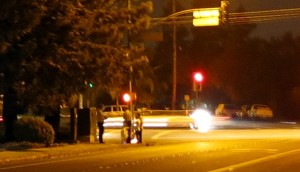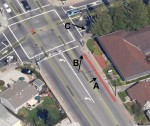Yesterday morning, on our way to the shop, my daughter (Becky) and I saw that Alameda was closed off at Jefferson, with two police cars, police tape, and, as we looked a bit closer, a bicycle pushed up against the curb. My heart sank. As we continued on Jefferson, it sank even more when we came across a large flatbed with a truck on it, followed by a police car.

It was some time before there were any news reports I could find on the accident, but eventually google came up with what I feared. A 14 year old girl, on her way to school (Woodside High), died in an incident with a truck. Both car and cyclist were making the same right-hand turn. You can view the intersection here, in Google street view. There are no sight line issues here, nothing to obscure the view of a cyclist making a turn in front of you. If that’s what happened; we know that both the motorist and the young girl were heading in the same direction, eastbound, on Jefferson, and both made the same turn, right, onto Alameda.
We don’t know if the truck had previously passed the cyclist prior to arriving at Alameda, with the cyclist then squeezing in between the curb and truck, taking an inside line to get ahead of it. This seems pretty unlikely, but it’s the only scenario I can think of in which the cyclist was at fault. Otherwise we have the girl ahead of the truck, sliding on the pavement and the truck too close behind her to stop, or the truck trying to make it around the corner simultaneously with the girl, who then slid out and went underneath the truck. With both truck and cyclist on Jefferson, approaching the intersection from the right lane, it’s the motorists responsibility to know where the cyclist is at all times and act accordingly. It’s hard to come up with a scenario in which the cyclist wasn’t visible to a motorist, and hard to believe that a 14 year old girl would be racing a truck to the corner and squeezing in-between it and the curb.

B: The curb pinch, which can force bikes suddenly into traffic
C: The area of impact (also shows the bike lane paint, which was likely slippery and may have caused the cyclist to crash to the ground, where she was run over)
Note that area A, used as a bus stop, is not where cyclists should be riding! This area should be marked in some way to keep bikes and cars to the left, so you don’t have the danger of a cyclist suddenly moving in front of traffic at the intersection.
Complicating matters is the curb pincher; if you look at the street view again, you’ll see that, coming into the intersection from Jefferson, the curb moves out into the roadway a couple feet, causing a cyclist to have to move out into the lane, possibly unexpectedly to a motorist. This is a serious road defect in my mind; cyclists should not be riding (on the last couple hundred feet of Jefferson leading up to the intersection) in a position where they’re going to have to move further into the roadway, at the last minute, to clear the intersection. That last couple hundred feet (which has a curb striped red for a bus stop) should have markings on the pavement directing bikes to ride further to the left, so they approach the intersection in a predictable straight line.
Another thing to be aware of is that the girl slid out, prior to the collision with the truck. The area in which she slid has standard-issue white paint on the pavement, used to identify a bike lane. This stuff is extraordinarily slippery when slightly damp, as would be the case on a foggy day. Nearly every experienced cyclist has had a scary experience on painted lines on roadways or the tar stripes used to seal cracks in asphalt. I don’t understand why the materials used can’t have something added to them for improved traction; I know that, on the east coast, they actually add some sand to the tar stripes for just that purpose. The problem has been identified, so is someone looking at solutions? How much evidence do we need that painted roadways are often very dangerous when wet?
We visited the scene of the accident last night, on our way home. I was with my daughter again, Becky, who was crying. And I was thinking about someone else who’s daughter wasn’t coming home, and at dinner I was thinking about what that must have been like for her family, and as I went to sleep wondered if I could possibly sleep at all that night if something had happened to one of my kids. I remember, and wish I could forget, what it was like when my son, Kevin, had his first big seizure (the first one that I knew about), and being in the emergency room while they worked on him for two hours, trying to get his seizures under control, and remembering the last thing I said to him and wondered, seriously, if that would turn out to be the last thing I ever said to him. Nobody needs to experience that. For Kevin, it worked out. For this young girl, I wish I couldn’t imagine.
Added 3/22/13- The police investigation has determined that the cyclist was at fault. To say that I’m at odds with this is an understatement; reading the on-line reports detailing the reasoning, I first notice a lack of detail, and second, nothing that contradicts anything I wrote the day following the accident (all of which survives above, intact, without further editing from 11/27/2012 at 6:32pm). Here’s a link to the “new” information. There will be further investigation, as the family has retained an attorney whose specialty is bicycle accidents, Gary Brustin. I’ve known him for several years; he’s been a tireless advocate for making things better for cyclists, not just in courts but through advocacy groups as well. I have hope. –Mike–